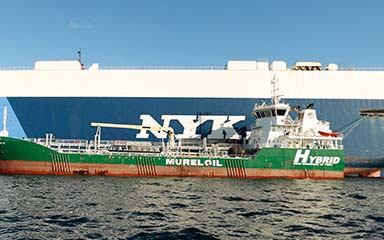Cepsa, a supplier of energy for maritime transport in Spain, has delivered second-generation biofuels to Japanese shipping company Nippon Yusen Kabushiki Kaisha (NYK Line) in the Bay of Algeciras using a dual approach with its hybrid barge, the ‘Bahía Levante’, to minimise the carbon impact of the operation.
For the delivery of 1,030 tons of Cepsa-produced B24 biofuel to the Atlas Leader, a 199m vehicle carrier operated by NYK Line, the Bahía Levante used 100% renewable diesel (HVO) while sailing and supplying the 2G biofuel in the harbour, and battery power when docked. With this, Cepsa claims to further solidify its position as a benchmark in the energy transition and a leader in the supply of energy for maritime transportation.
Second-generation biofuels fuels can be used without ship modifications and have the potential to decrease GHG emissions by up to 90% throughout their lifecycle compared to traditional fossil fuels. Cepsa can supply these sustainable fuels to customers on a regular basis, and by using its barge powered by batteries and biofuels, it can further reduce the carbon impact of operations.
Samir Fernández, Director Marine Fuel Solutions, Cepsa, said: “As the shipping industry steps up its pursuit of decarbonisation solutions, we are determined to maintain our leadership in marine fuel supply, offering our customers increasingly sustainable solutions through vessels that also comply with regulatory requirements. We are delighted that our second-generation biofuels are continuing to be harnessed by the maritime industry as they progress on their decarbonisation journey. The supply to NYK emphasises our double effort to support our customers in their decarbonisation journeys and decarbonize our own operations.”
The use of biofuels enables shipping companies to stay ahead of the decarbonisation objectives of IMO and the EU. The IMO recently updated its strategy for reducing GHG emissions in maritime transportation, establishing ambitious targets that will incrementally rise from 20% in 2030 to achieving net-zero emissions by 2050, compared to 2008 levels. Meanwhile, the EC’s Fit for 55 package includes the Fuel EU Maritime legislative initiative, which aims to reduce GHG emissions intensity in maritime transport by 2% in 2025, 6% in 2030 and 80% in 2050, compared to 2020 levels, promoting the use of sustainable fuels.
Cepsa’s initiative further underscores its commitment to second-generation biofuels as a catalyst for advancing the decarbonisation of maritime transportation. Through its 2030 strategy, ‘Positive Motion’ Cepsa aims to lead sustainable mobility and promote the decarbonisation of heavy transport through the production of green molecules. The company aspires to be the leading producer of biofuels in Spain and Portugal by 2030 with an annual production capacity of 2.5m tons, and of green hydrogen with an annual production capacity equivalent to 2GW. It has announced ambitious projects for the production of green ammonia and green methanol.
Image: ‘AtlasLeader’ receives biofuel from hybrid bunker ship ‘Bahía Levante’ (source: Cepsa)



